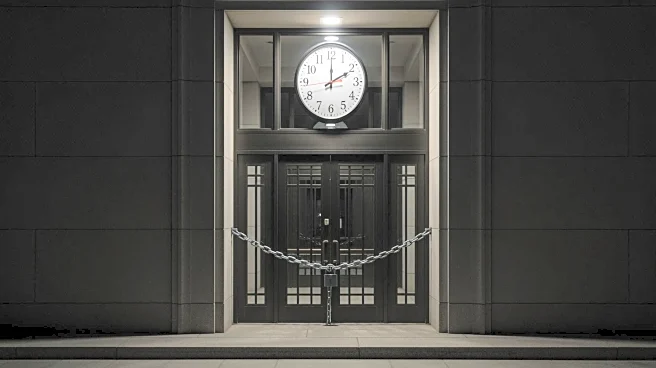What's Happening?
The federal government shutdown, which began on October 1, is likely to extend into mid-November as negotiations in the Senate remain stalled. According to Polymarket betting odds, the chance of the shutdown lasting
until November 16 has increased to 38 percent, up from 10 percent a week ago. The shutdown occurred after legislators failed to agree on a funding bill, with Democrats and Republicans at odds over key issues. The Senate filibuster requires 60 votes to advance bills, necessitating bipartisan support for a resolution. Republicans, who control both the House and Senate, have proposed a bill that has already passed the House, while Democrats seek concessions on healthcare funding. The shutdown has led to unpaid or furloughed federal workers and disruptions in services such as passport processing and national parks.
Why It's Important?
The prolonged government shutdown has significant implications for federal employees and public services. Hundreds of thousands of federal workers face financial uncertainty due to unpaid wages, and essential services are disrupted, affecting passport processing and access to national parks. The shutdown also impacts government benefits, potentially affecting vulnerable populations reliant on federal assistance. The political stalemate highlights deep divisions between Democrats and Republicans, particularly over healthcare funding. The shutdown's extension could exacerbate economic challenges, including high costs and an economic slowdown, as noted by Democratic leaders. The situation underscores the need for bipartisan cooperation to resolve funding issues and prevent further disruptions.
What's Next?
The Senate is scheduled to reconvene on Monday, with resolving the shutdown as a top priority. Senate Majority Leader John Thune has expressed willingness to negotiate on Affordable Care Act subsidies, a key issue for Democrats. However, it remains uncertain whether this offer will garner enough support to end the shutdown. The House of Representatives has not been in session since September 19 and is unlikely to return until the shutdown concludes. The ongoing negotiations will determine the duration of the shutdown and its impact on federal operations and services.
Beyond the Headlines
The government shutdown raises ethical and political questions about the responsibility of elected officials to ensure the functioning of essential services. The impasse reflects broader political polarization and challenges in achieving bipartisan consensus on critical issues. The shutdown's impact on federal workers and services highlights the vulnerability of public sector employees to political disputes. Long-term, the shutdown could influence public perception of government effectiveness and accountability, potentially affecting future elections and policy decisions.









